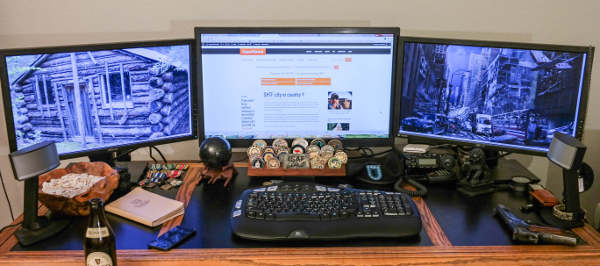 There’s always been a lot of debate on whether you should stay in (or go to) a city if society collapses. Some say there’s safety in numbers and the city is best. Some say heading for the hills is the best option. Here’s what I think.
There’s always been a lot of debate on whether you should stay in (or go to) a city if society collapses. Some say there’s safety in numbers and the city is best. Some say heading for the hills is the best option. Here’s what I think.
This is gonna be a pretty big post but I want to make sure you have enough to think it through and enough resources to look at later. You may also be interested in my previous article: Should you build a SHTF team or go it alone.
First: every situation is different. Whatever ideas I talk about here may not be applicable in the slightest in your situation if you’re ever unfortunate enough to have to deal with something like this. So for this exercise, we’ll be talking about a total collapse of society for the most part, and not just a local calamity.
In almost all cases, people say that they’re either going to stay in a city or head out into the wilderness and set up in a cabin or build something. I’ll go through that first so you can get some ideas.
Some basic precepts that you should follow:
- If you can stay home – stay home. Moving is dangerous. Bugging out should be a last resort, whether it’s a temporary or permanent bug out.
- If you don’t know where you’re bugging out to – don’t bug out. Unless your home is destroyed or you’re facing a likely demise, you shouldn’t just head out.
- Have a plan of where you’ll go now, and what circumstances will cause you to go (see #2).
- If you have a bug out shelter to head to, expect that it’ll be taken over or at least ransacked when you show up. Cache accordingly.
- If society does collapse and you’re going to willingly leave your home but you can’t get out immediately – as in the first few minutes – just stay put for a few days until things calm down. It will get worse later but the first few days are going to be hell.
That said, let’s dive into this a bit. Let’s say that your home is destroyed somehow. You have to leave it. Let’s say it burns down and you get out with anything you can carry. Do you find another place in town? Do you head into town if you’re already out? Do you head into the woods? Do you find a different town?
Obviously, we need some kind of scenario to put us in the right frame of mind. Let’s assume that society has completely collapsed and there are no social services any longer such as police, fire, sewage and trash, etc and grocery stores have gone empty (which would have happened the first day). This has happened all throughout history, and happened in Bosnia in 1992.
We have no shortage of fiction (although a lot of it is reality-based in the concept) that can show how this could happen.
There are several books that have covered this. Here are just a few, along with their descriptions to give you an idea:
- One Second After
– In a Norman Rockwell town in North Carolina, where residents rarely lock homes, retired army colonel John Matherson teaches college, raises two daughters, and grieves the loss of his wife to cancer. When phones die and cars inexplicably stall, Grandma’s pre-computerized Edsel takes readers to a stunning scene on the car-littered interstate, on which 500 stranded strangers, some with guns, awaken John’s New Jersey street-smart instincts to get the family home and load the shotgun. Next morning, some townspeople realize that an electromagnetic pulse weapon has destroyed America’s power grid, and they proceed to set survival priorities. John’s list includes insulin for his type-one diabetic 12-year-old, candy bars, and sacks of ice. Deaths start with heart attacks and eventually escalate alarmingly. Food becomes scarce, and societal breakdown proceeds with inevitable violence; towns burn, and ex-servicemen recall “Korea in ’51” as military action by unlikely people becomes the norm in Forstchen’s sad, riveting cautionary tale, the premise of which Newt Gingrich’s foreword says is completely possible. –Whitney Scott —
- EMP: Equipping Modern Patriots: With a Story of Survival
– EMP: Equipping Modern Patriots is a harrowing story of survival following the destruction of the electric grid and nearly every electronic device in the country. Can you imagine a world with no phones, no TV, no internet, and no way to access your bank account? Without the electric grid, there would be no lights, no heating or air conditioning in your house, no public water, and the sewer would likely back up into your home. Without modern vehicles or interstate trucking, the supermarkets would quickly run out of food and supplies. Unprepared, the government would be helpless to feed the masses and maintain order. Our humanity is questioned when survival of the fittest becomes reality. Jonathan Hollerman paints a vivid and disturbing picture of society falling apart after an Electromagnetic Pulse attack against our nation. This is not only a thrilling story, but offers practical life-saving advice for an imminent threat. If you enjoyed “Patriots” by James Wesley Rawles or “One Second After” by William Forstchen, then you will enjoy this story of survival.
- Patriots: A Novel of Survival in the Coming Collapse
– America faces a full-scale socioeconomic collapse—the stock market plummets, hyperinflation cripples commerce and the mounting crisis passes the tipping point. Practically overnight, the fragile chains of supply and high-technology infrastructure fall, and wholesale rioting and looting grip every major city. As hordes of refugees and looters pour out of the cities, a small group of friends living in the Midwest desperately tries to make their way to a safe-haven ranch in northern Idaho. The journey requires all their skill and training since communication, commerce, transportation and law enforcement have all disappeared. Once at the ranch, the group fends off vicious attacks from outsiders and then looks to join other groups that are trying to restore true Constitutional law to the country.
- Desperate Times (Volume 1)
– Despite all the warning bells, Black Friday arrives as a devastating tidal wave that completely destroys our fragile economy in a single day. There is panic in the streets as banks close their doors, seemingly forever, at noon. Store shelves are swept bare and the gas pumps soon run dry. Jimmy Logan watches in disbelief as his world crumbles before his eyes. Luckily, he has friends who have planned ahead for this nightmarish scenario and he joins up with a group who plan to ride the storm out in northern Minnesota. Some of their group will be dead before the sun sets. Jimmy soon finds himself in the battle of his life. The world changes in a single day and there seems to be no going back. People want what they have and they are willing to do anything, even kill, to get it. The government responds to the crisis by using the National Guard to round up the population and to secure them in relocation camps. Those who resist are shot. This is Jimmy’s story, but the premise might have been torn from today’s headlines. The diverse group of people in this story could be your neighbors; your relatives, and this is a very realistic look at what the future might hold for all of us. What would you do to feed your family if you suddenly found that your life savings was as worthless as yesterday’s newspaper? How far would you go to protect what you had, in case it was all that stood between you and starvation? Desperate Times explores these questions from Jimmy’s point of view, the result is a thought-provoking story that may change the way you look at the world.
- Last Stand: Surviving America’s Collapse
– John Mack, a prepper and former soldier, struggles to save his family and community after an EMP (electromagnetic pulse) takes out the country’s electrical grid. With most electronics, communications and transportation destroyed in a matter of seconds, the nation quickly collapses into anarchy. For John and the other residents of Willow Creek Drive, the breakdown of social order throws them back to the 1800s. As the community tries to come together, a powerful outside force appears that threatens their survival. Will John’s years of military and prepping experience be enough to keep them safe? Mixing tons of useful prepping tips into an action-packed story, Last Stand: Surviving America’s Collapse, is a must-read for any fans of survival fiction.
- The Survivalist (Anarchy Rising)
– After the worst pandemic in mankind’s history, anarchy threatens to break apart the United States. The government is years away from providing even the most basic necessities. Militias, gangs of convicts, and rogue soldiers face off in a violent free-for-all as they vie for power. Few safe havens remain. Big cities have been overrun with deformed survivors of the Superpox-99 pandemic. Smaller towns are being overtaken by authoritarians and lawless thugs. And congested interstates have become thoroughfares for desperate travelers and bandits seeking to capture women and supplies. President Glass must face daunting challenges, completely unaware that some of her closest advisors are using unthinkable methods to have her removed. Their clandestine hunt for her eleven-year-old daughter, Samantha, intensifies, and the only person standing in their way is a ruthless convict who will stop at nothing keep the young girl safe. Duty drives Deputy Marshal Mason Raines to leave the small town of Boone to discover the fate of his fellow lawmen. With his faithful wolfhound, Bowie, at his side, he crosses paths with desperate refugees, a bloodthirsty hangman, and savage cannibals. Only as he discovers the horrific truth, does he realize that he may be the last of his kind.
- The China Pandemic (Graham’s Resolution) (Volume 1)
– #1 Bestseller in Dystopian and Post-Apocalyptic fiction in May 2014! What the world dreads most has happened – because of a mutated avian bird flu (H5N1) pandemic. It has ravaged the globe. Only 2% of the population has survived. A dying mother knows that her young child is among the few immune to the virus. What will she do to ensure his survival before her own coming tragic death? Meanwhile, Graham has buried his last remaining family member. Following his father’s advice to make it to the family cabin, he meets with triumph and tragedy; learning new rules along the way. Just when he thinks he’s finally got a handle on this new world, he’s taken by surprise, as he learns he’s not alone. A hidden yet vulnerable community of Preppers are nearby. Will he find the strength to escape these dangers and go on living? And more importantly, will he have the ability to protect those he’s come to trust?
- Going Home: A Novel (The Survivalist Series)
– When Morgan Carter’s car breaks down 250 miles from his home, he figures his weekend plans are ruined. But things are about to get much, much worse: the country’s power grid has collapsed. There is no electricity, no running water, no Internet, and no way to know when normalcy will be restored—if it ever will be. An avid survivalist, Morgan takes to the road with his prepper pack on his back. During the grueling trek from Tallahassee to his home in Lake County, chaos threatens his every step but Morgan is hell-bent on getting home to his wife and daughters—and he’ll do whatever it takes to make that happen.
- Surviving Home: A Novel (The Survivalist Series)
– In A. American’s first novel, Going Home, readers were introduced to Morgan Carter, the resourceful, tough-as-nails survivalist who embarks on a treacherous 250-mile journey across Florida following the collapse of the nation’s power grid. Now reunited with his loving wife and daughters in this follow-up toGoing Home, Morgan knows that their happiness is fleeting, as the worst is yet to come. Though for years Morgan has been diligently preparing for emergency situations, many of his neighbors are completely unready for life in this strange new world—and they’re starting to get restless. With the help of his closest companions, Morgan fights to keeps his home secure—only to discover shocking information about the state of the nation in the process.
- Escaping Home: A Novel (The Survivalist Series)
– After the collapse of the nation’s power grid, America is under martial law—and safety is an illusion. As violence erupts around him, Morgan Carter faces one of his most difficult decisions yet: whether to stay and defend his home, or move to a more isolated area, away from the prying eyes of the government. He and his family are hesitant to leave their beloved Lake County, but with increasingly suspicious activities happening in a nearby refugee camp, all signs point towards defecting. Morgan and his friends aren’t going to leave without a fight, though—and they’ll do anything to protect their freedoms.
- Bugging Out (The Bugging Out Series) (Volume 1)
– It came without warning. A microscopic enemy that methodically turned the green earth grey. Decimating the food chain until only the prepared were left. But preparation alone is not enough to shelter Eric Fletcher from the chaos to befall the world as governments fail their citizens. Seeking refuge at his remote property in the north of Montana while society devolves into starving anarchy, he finds himself facing not only the rigors of survival, but also the appearance of a self-proclaimed ruler promising to set his piece of the withered world right for those who follow. Those who don’t will suffer the consequences of his sadistic retribution. Finding another survivor near his refuge, Eric attempts to steer clear of the conflict brewing in nearby towns. But soon he and his new found partner in survival are targeted by the dictatorial leader, leaving them two options–run, or fight for what is right.
- The Dead Familiar (Winterhaven) (Volume 1)
– In the twilight hours of a failing world, one man seeks to bring his loved ones to safety. Jack Hightower: Marine, barkeep, and doomsday prepper. He knows of the coming calamity, and on the final night of an old world he seeks a new beginning. This is the story of that night, the tale of how Jack and his survivor’s colony in the north came to be.
- Pulse
– Everyone thought the world would end in a rain of atomic fire; no one suspected it would come from a piece of bad fish. An unidentified and aggressive illness begins spreading in North Dakota, and the nation panics. People are becoming sick, losing their minds, and murdering each other in disturbing ways. The government is struggling to come up with a solution, but as the epidemic mutates within the civilian population, its grip grows stronger. Dom is thousands of miles away near Seattle, witnessing his city collapse. The pandemic hasn’t even reached them, but people are panicking and rioting as though it’s already there. Holed up in his apartment with his best friend and girlfriend, Dom fears the worst. Dr. Adam Baker dreamt of a different life; one full of scientific discoveries and not a failed marriage and twin daughters who hate him. But when the opportunity to make a difference arises and his team has to find a solution to this national crisis, he finds that what he wanted is more than he bargained for. Who will survive in the wake of this devastation?
- Alas, Babylon
– “Alas, Babylon.” Those fateful words heralded the end. When a nuclear holocaust ravages the United States, a thousand years of civilization are stripped away overnight, and tens of millions of people are killed instantly. But for one small town in Florida, miraculously spared, the struggle is just beginning, as men and women of all backgrounds join together to confront the darkness.
- 299 Days: The Preparation (Volume 1)
– Meet Grant Matson: lawyer, father, suburbanite husband who awakens to the fragility of modern society and embarks on a personal journey that introduces him to a world of self-reliance and liberation. 299 Days: The Preparation, the first book in the 299 Days series, depicts the inner struggles Grant must face as he exists in a social system he recognizes as unsustainable and on the verge of collapse, but one in which he has built his life around. What begins as a return to his roots, self-sufficiency and independence, becomes a full blown move to prepare for what may come. Engaging, insightful and a bit suspenseful, follow Grant’s transition from a self-perceived “sheeple” to a full-blown “prepper.” Will his fears come true? Is he an extremist? What if nothing happens? What if something does?
- 299 Days: The Collapse (Volume 2)
– Picking up where The Preparation ended, the collapse begins to unfold in this second book of the 299 Days series. In The Collapse, the government stops working, guns and ammo are in high demand, and a trip to the gas station has become a mission rather than an errand. Grant and the Team see these warning signs and know it is only the beginning, so they begin taking action to protect themselves and their loved ones. As they prepare to get out of dodge after a deadly incident in Grant’s neighborhood, they will soon learn whether the preparations they made in Book One will be enough to survive the breakdown of society, or if they don’t stand a chance against greed and violence in the face of a collapse. The resulting chaos and fear that begins to envelop the country will strip all of the characters of what they know to normal, and will require them to question what they will stand for, what they will stand up against, and, most importantly, who they will stand with.
- The Dog Stars (Vintage Contemporaries)
– Hig somehow survived the flu pandemic that killed everyone he knows. Now his wife is gone, his friends are dead, and he lives in the hangar of a small abandoned airport with his dog, Jasper, and a mercurial, gun-toting misanthrope named Bangley. But when a random transmission beams through the radio of his 1956 Cessna, the voice ignites a hope deep inside him that a better life exists outside their tightly controlled perimeter. Risking everything, he flies past his point of no return and follows its static-broken trail, only to find something that is both better and worse than anything he could ever hope for.
There are a lot of movies out there as well but I usually hate watching them. Movie directors take a lot more artistic freedom than authors do and make the whole thing stupid sometimes.
So, let’s look at both scenarios. If society completely collapses, and is going to stay collapsed for many years, what are the advantages of the different decisions you could make?
Advantage of staying in the city:
- A lot more people to band together with.
- A lot easier to find shelter that’s already been built.
- The basic building blocks of society are already there, which could be used to create a new local one.
- You probably have friends or family in the area that you know.
- It may be easier to hide in a city as long as you don’t leave the building you’re staying in and leave no indication that you’re there.
- You’re more likely to find people with specialized skills such as doctors and mechanics.
Disadvantages of staying in a city:
- Cities have no real way to sustain people. There are no farms and no wildlife other than rats and pigeons. You won’t have food.
- Cities have a LOT of bad people per capita who will band together as they always do, even in much less devastating events and will try to take what you have or worse.
- Without a society to support it, sewage and trash systems will cease to function. Diseases will be rampant. Water supplies will become contaminated.
- In most cases, you won’t have water continue to run to your home. You’ll have to leave your house to go get it.
- You’ll have to compete with a lot of people for a small amount of resources. The fact is that cities will not empty. Most people cannot survive in the wilderness and will be forced to make do in the city. It’s not nearly as easy as it looks on TV.
- You’ll have to figure out quickly who you can trust and who you can’t because you’ll be running into people fairly frequently.
- If you do manage to get security etc, it would be very difficult to raise livestock because they require room and food/water as well.
Advantages of living in the wilderness:
(assuming you’re in the US, Australia or Canada – or most other countries. This may not apply everywhere):
- Food is plentiful in a lot of North America and other places. Even if the cities emptied (see above), the US and Canada have a LOT of territory. Most people cannot survive in the wilderness so they’ll either die or head back to the city.
- You’re less likely to run into someone intent on taking your stuff, or worse. Unless you camp right outside of town, the population density will be much less. Studies show time and time again that less population density = less crime.
- Water is almost everywhere and is much less likely to be tainted.
- If you have survival skills and get a shelter, you have a good chance of survival.
The disadvantages of living in the wilderness:
- You have to already have certain survival skills or you most likely won’t survive. You’ll only have a day or two to find water and depending on the weather, you may only have a day or two to find shelter. You can go for a while without food but you’ll eventually have to know how to trap or catch something to eat – or at least know how to identify which plants are safe.
- You’ll only have those who live with you and possibly a few neighbors around for protection from animals or other humans.
- There is little shelter available. You’ll have to make it or find a cabin or other dwelling that’s already built.
- There is nothing out there that you can use to immediately build a local society. No sewage, no industry, no transportation. You’ll have to build everything from scratch.
- You can’t pull security 24 hours/day, even if you don’t have to find food/water/shelter. You will be vulnerable.
So, as you can see – both sides have good and bad points. So what would my suggestion be?
If society completely collapsed, we’d be back to the way life was 150-200 years ago. How did they survive?
They lived in small towns.
I think the best place to bug out to if SHTF and there would be no running government or services for many years would be to find a small town a ways away from a large city. If there isn’t one, you’ll have to make one. And by a ways away, I mean many miles away. A suburb is better than nothing though.
A small town can band together and build things that a small group cannot. It’s quite difficult to build a barn or a house on your own. It’s pretty simple if you have 50 people to help.
A small town can afford to have specialization and division of labor. Food can be caught and trapped by some while others pull security. Those with a medical background can focus their time on helping people while others do things that they’d have to do on their own without a group. With more people, you’re more likely to find people who already have skills like prior military or law enforcement and construction or waste management.
A small town can get to know everyone. A small, local government can be quickly stood up.
If a roving band of thugs came by, a small town would have a much better chance to defend you. In a lot of cases, these guys would probably just move on to find someone else.
So what would I recommend you reading to get an idea of what you should be thinking of after you’ve hunkered down somewhere in a SHTF scenario? First, read some of the books above. The authors have already spent thousands of hours thinking about this and work it through in a story that you can spend many hours learning – or at least giving you an idea of what you don’t know. Here are my suggestions of other books, but you may need to read several to get a good base of knowledge.
Foxfire Book Series – These are a must-have.
For over 40 years, high school students in Foxfire programs have helped to gather and publish information about their Southern Appalachian heritage. Best known for the best-selling Foxfire Book series, the series and the other topical titles were all grown from interviews gathered for The Foxfire Magazine. The success of the student-driven program led to professional research that generated the Foxfire Approach to Teaching and Learning and its support materials for use by other educators hoping to achieve similar levels of student involvement and create life-long learners.
The Knowledge: How to Rebuild Our World from Scratch –
How would you go about rebuilding a technological society from scratch?
If our technological society collapsed tomorrow, perhaps from a viral pandemic or catastrophic asteroid impact, what would be the one book you would want to press into the hands of the postapocalyptic survivors? What crucial knowledge would they need to survive in the immediate aftermath and to rebuild civilization as quickly as possible—a guide for rebooting the world?
Human knowledge is collective, distributed across the population. It has built on itself for centuries, becoming vast and increasingly specialized. Most of us are ignorant about the fundamental principles of the civilization that supports us, happily utilizing the latest—or even the most basic—technology without having the slightest idea of why it works or how it came to be. If you had to go back to absolute basics, like some sort of postcataclysmic Robinson Crusoe, would you know how to re-create an internal combustion engine, put together a microscope, get metals out of rock, accurately tell time, weave fibers into clothing, or even how to produce food for yourself?Regarded as one of the brightest young scientists of his generation, Lewis Dartnell proposes that the key to preserving civilization in an apocalyptic scenario is to provide a quickstart guide, adapted to cataclysmic circumstances. The Knowledge describes many of the modern technologies we employ, but first it explains the fundamentals upon which they are built. Every piece of technology rests on an enormous support network of other technologies, all interlinked and mutually dependent. You can’t hope to build a radio, for example, without understanding how to acquire the raw materials it requires, as well as generate the electricity needed to run it. But Dartnell doesn’t just provide specific information for starting over; he also reveals the greatest invention of them all—the phenomenal knowledge-generating machine that is the scientific method itself. This would allow survivors to learn technological advances not explicitly explored in The Knowledge as well as things we have yet to discover.
Most of the world’s population now lives in cities. So if we are to address the problems of environmental deterioration and peak oil adequately, the city has to be a major focus of attention.
Ecocities is about re-building cities and towns based on ecological principles for the long term sustainability, cultural vitality and health of the Earth’s biosphere. Unique in the literature is the book’s insight that the form of the city really matters – and that it is within our ability to change it, and crucial that we do. Further, that the ecocity within its bioregion is comprehensible and do-able, and can produce a healthy and potentially happy future.
Ecocities describes the place of the city in evolution, nature and history. It pays special attention to the key question of accessibility and transportation, and outlines design principles for the ecocity. The reader is encouraged to plunge in to its economics and politics: the kinds of businesses, planning and leadership required. The book then outlines the tools by which a gradual transition to the ecocity could be accomplished. Throughout, this new edition is generously illustrated with the author’s own inspired visions of what such rebuilt cities might actually look like.
Hesperian’s classic manual, Where There Is No Doctor, is arguably the most widely-used health care manual in the world.
This 2013 updated reprint features new information on tuberculosis and HIV, updated medicines, anti-retroviral therapy, and preventing HIV in babies.
Useful for health workers, clinicians, and others involved in primary health care delivery and health promotion programs, with millions of copies in print in more than 75 languages, the manual provides practical, easily understood information on how to diagnose, treat, and prevent common diseases. Special attention is focused on nutrition, infection and disease prevention, and diagnostic techniques as primary ways to prevent and treat health problems.
The bestselling resource for modern homesteading, growing and preserving foods, and raising chickens, The Encyclopedia of Country Living includes how to cultivate a garden, buy land, bake bread, raise farm animals, make sausage, can peaches, milk a goat, grow herbs, churn butter, build a chicken coop, catch a pig, cook on a wood stove, and much, much more. This comprehensive resource is the most authoritative guide available to a sustainable lifestyle and living off of the land.
Carla Emery started writing The Encyclopedia of Country Living in 1969 during the back-to-the-land movement of that time. She continued to add content and refine the information over the years, and the book went from a self-published mimeographed document to a book of 928 pages.
This 40th Anniversary Edition reflects the most up-to-date resource information and the most personal version of the book that became Carla Emery’s life work. It is the original manual of basic country skills that have proved essential and necessary for people living in the country, the city, and everywhere in between.
Some of these are in my previous post: The best books to have AFTER SHTF.


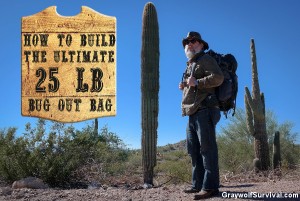

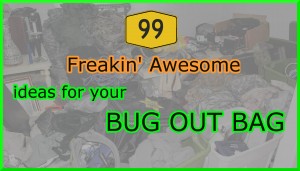
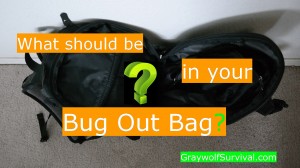

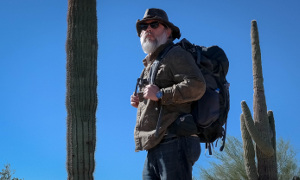
I currently live in a small town (well, right outside one), so I’m glad to hear you think that’s the way to go.
I desperately want to bug in, since I live on a ranch that could be completely self-sufficient starting tomorrow (most missed aspect of civilization: chocolate) and that has been in my family for hundreds of years. Adjusting psychologically to the prospect of bugging out has been one of the most difficult parts of prepping for me, since my instinct is more the Cheyenne Dog Soldier approach of stand my ground or die trying rather than contemplate the alternative. Realistically, though, bug out is a possibility I need to be prepared for. Particularly since my town, though small, has a major highway running through it with large cities about a hundred miles off in either direction, and our property was unfortunately bisected when they built the damn highway.
We’ve got a fishing camp in a coastal community that is smaller, more remote, and more defensible than our home town (only one way into town, all other sides ocean), and it’s one possibility, but I see a few problems there: lack of easy fresh water, unfortunate proximity to nuclear power plant, hurricanes, possible sea level rise & more intense storms due to climate change, collapsing ocean ecosystems may mean food not as abundant in future as currently.
We do know lots of people well in both places and have known them for years, which I think is important. If the fishing camp were not an option for whatever reason, I don’t know where we’d go. Bug out plans, routes, caching, etc. (along with communications) is an area I really need to work on, so articles like this are very helpful and thought provoking.
The key is to develop a small community. You’d have to do that if SHTF so it’d be easier if you’d start it now. You’re in an awesome position though.
That’s good advice. We know trustworthy people with relevant skills, it’s just a matter of discussing it with them explicitly and getting buy-in, which I have mostly avoided because I feel awkward about it, which is a lame excuse.
My sister and brother-in-law are doing something similar in Georgia. He’s a doctor so he takes care of the community’s health, another family is good at hunting so they can contribute meat, etc. It’s mighty unsettling what’s coming down the pike. Wish more people will wise up.
Skills are a HUGE asset.
Yep…they can’t take skills away from you unless they snuff you out too!
Our farm, which we have been working on for many years, is surrounded by suburbia. We don’t talk too much about what we are doing because we don’t want people coming by to see what we have. But, we have worked hard to be self sustaining if necessary. I agree that we would need more people to sustain civilization if we wanted to stay in place or go somewhere remote. Now I just want to curl up on the couch and read all the good books you have suggested here. Thank you
Always a pleasure to read your articles.
I’d like to go with the small town in the 3,000 range. A lot of skill sets to pull from, enough for defense, lots of hands for ag. ops, schools and some resources already in place.
Thanks for a great channel.
I have be watching this guy, Kgoat, he is doing a SHTF journal series set in suburbia, interesting and entertaining.
https://www.youtube.com/watch?v=mOdWCh4odfI
Living in NYC, I really have no choice but to Bug Out. Half of the population is criminal and violent. There will be immediate rioting and death. Luckily, I have some very useful skills and my family lives in rural PA. If I can get there I will have a fairly good chance of helping my family survive.
Let me add Chicago to the Bug Out list as well. You should bug out within two hours after an event happened to give yourself a fighting chance. It’s not just the criminal element to worry about here but the regular urban yuppie type as well because these people don’t have a clue how to survive if it isn’t a smartphone app.
A book I would highly recommend is Cody Lundin’s When All Hell Breaks Loose. Not a fictional book, it is a how to survive book. Lots of great info in it.
http://www.codylundin.com/Loose.html
I live in the Phoenix area, and I think heading north, out of the valley, maybe towards a lake. I wonder though, would everyone else flee the city as well, or stay put? I’d rather get out of the city, but wouldn’t do much good if half the population is heading in the same direction.
I think it’s a safe bet that if the power grid went down, People would be heading out of the Phoenix area. It’s not just due to the heat, you wouldn’t be able to get water without going to the salt river or the water aquaducts. I think most would head to areas like Strawberry but Colorado would probably be a better bet if you can make it that far.
I have started a small tactical b.o.b bag and so has my dad. I’m only 13 so I don’t exactly know everything. I’m ok with fire and water but that’s about it. What tactical gear would you recommend I don’t care about price lol thanks GrayWolf oh and I thing I would like to maybe see you do an article on is how to survive with pets. (I have 2 labs so it would help a lot lol).
You should get tactical training and not worry about tactical gear. After training, you’ll know what gear you need based on your training and abilities.
Your right about small towns maybe, but if the grid goes down ,it will probably be down for more than 10 months .that in itself will kill millions. In the city disease will kill alot of people, roving gangs.in my opinion it will be safer in the country if you have a few skills.you have a bettter chance. Most people wont go to the wild.
I mostly argue for staying put, but if you’re in a situation where you’re forced to move then I’d probably still go city with friends versus trying to go it alone in the wilderness. For the long term though agreed with you on smaller group working together is best option for real survival.